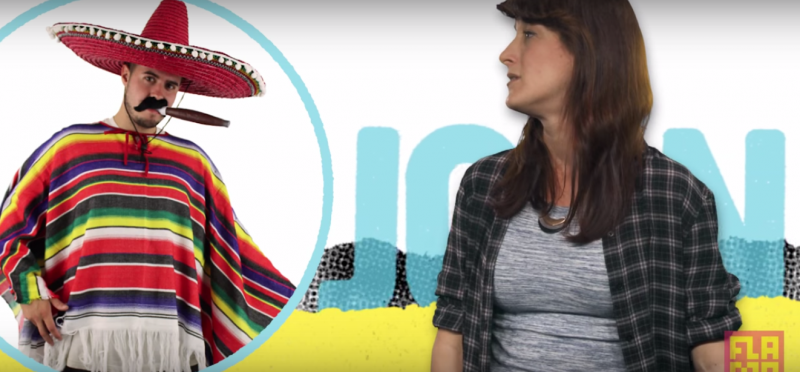
“I have made it my duty to clear up some common misconceptions about my people. ‘My people’ being Latinos, not redheads. ‘Cause they are the devil.’ Joanna Hausmann vents her frustration with the stereotypes that people have regarding Latinos in the US, in her series “Joanna Rants.” Screenshot: FLAMA's YouTube channel.
Humor can be an interesting way to analyze the phenomenon of groups migrating to wealthier countries, where they become minority populations. Latin Americans in the United States are a perfect example of this occurrence—so much so that the Spanish-language television network Univision saw a market it could exploit: a younger, generally bi-cultural audience. Often comprised of second and third generation immigrants, these viewers are very experienced in the use of new media.
Launched by Univision, Flama is a network built on humorous, short videos. Flama's content is only available online through Hulu and YouTube, and it addresses topics like lifestyle, sports, music, and especially comedy. Humor is the vehicle for the station's commentary on the cultural differences between Latinos and Americans, as well as the misconceptions, stereotypes, and prejudices.
The videos are made predominantly in English—often with subtitles—and they are intended for a young audience interested in Latin American culture. Flama is also has a strong presence on Twitter, Facebook, Instagram, and even Google+.
Even though the videos predominantly portray middle-class Latin Americans, without putting into question the discrimination suffered by this very heterogeneous group in the United States, there is a space to criticize the largely negative stereotypes and preconceptions, which North American society usually propagates about this group. Some of the issues addressed using humor and comedy are:
The problems Latin American newcomers experience at the office, as a result of differences relating to family structure and cultural and linguistic misconceptions:
The irritation that Latin Americans express in light of the stereotypes created by North Americans at their expense:
The prejudices that “white Latinos” are fed up with hearing, from their North American friends and acquaintances, regarding their physical appearance:
Situations related to bilingualism, particularly to the use of “Spanglish”:
Stereotypes of Latin American women at the moment they initiate an emotional relationship:
In ways like this, Flama challenges the essentialization of Latin American identity and shows the plurality and existing variety at its core. Large communities in the US are unaware of issues like those described above, but the cultural intersections will always great opportunities to spark people's interests.







5 comments
Maybe I will do one about “gringos” — I am in Colombia right now …and if you are white (which is my reality) then we are all “gringos” so the stereotyping goes both way and this is a universal problem.
Watched a couple, pretty funny. Thx for the story.
“I will cut you … ” still laughing at that one.